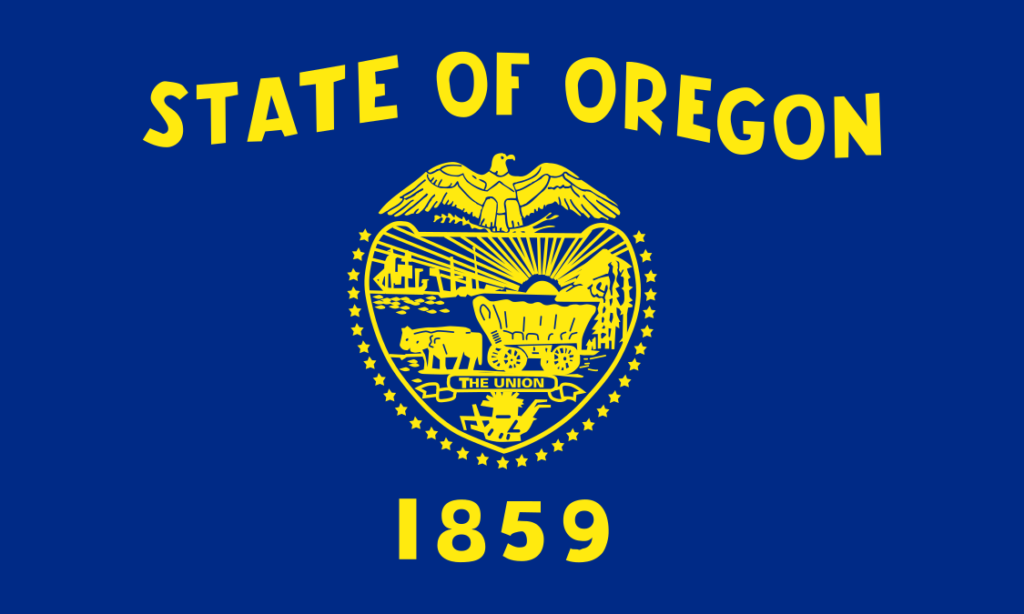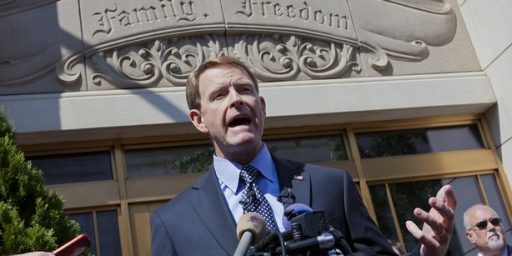What the Oregon Senate Primary Tells us about our Party System
This is more about structural conditions than it is about the GOP.

As James Joyner noted earlier this week, the Republican nominee for US Senate in the State of Oregon has shown connections, if not full support, to the conspiratorial Q/Anon internet phenomenon. James’ post describes the basics of this movement (for lack of a better word), but I will emphasize that it is disturbing to have any public figure subscribing to or promoting Q/Anon’s worldview and it is (or should be) an embarrassment to the Republican Party that they now have a nominee affiliated at all with it.
However, to what degree is this revelatory about the current evolution of the GOP? The fact is, as unsettling as it is, this is a non-competitive race that simply underscores a variety of institutional flaws in our electoral apparatus.
First, important context can be established by looking at the partisan makeup of the state.
Recent Senate races:
- 2016: 56.6% D, 33.3% R
- 2014: 55.7% D, 36.9% R
- 2010: 58.3% D, 39.3% R
The last time the state voted Republican for president was in 1984, when the state went for Reagan. The states’s House delegation is four Ds and one R.
The governor of Oregon has been a Democrat since 1987.
Statewide election of a Republican is not impossible, as Dennis Richardson won the Secretary of State position in 2016 47%-43%.* However, the position had been occupied by a Democrat for the previous twenty years (5 terms).
In general, it is fair to note that the state has been clearly majority Democratic since the mid-to-late 1980s (with a couple of statewide executive offices going Republican in the very early 1990s).
Fundamentally, this is a heavily pro-Democratic electoral environment. Given that the chances are low that a Republican would win, it diminishes the incentive for quality candidates to run (the bios of the GOP aspirants is not exactly set-the-world-on-fire types). It certainly undercuts the interests of donors in funding a race.
As I recently noted, the bottom line remains that a central function of political parties is to provide voters with a shorthand. Most voters don’t know the difference between John Smith and Linda Jones when they see their names on the ballot, but if there is an R after Smith’s name and a D after Jones’ that the voter has a way to make a choice.
As a result, a lot of Oregon Republicans are going to vote for a pro-Q/Anon politician without probably even knowing what that means.
I would be willing to bet that many of us have unwittingly voted for kooks because we voted our partisan preferences for a candidate destined to lose due to the partisan mix of the district. For example. with the exception of Doug Jones in the 2017 special election, I am not sure if the Democratic Party of Alabama has had a quality candidate for US Senate the 22+ years I have lived in the state.
More than telling us anything about the GOP, per se, this race does tell us two really important things about our institutions:
- The lack of competition is a problem and it leads to suboptimal politics. If we had more proportional outcomes in elections that promoted multiple parties, the parties would be incentivized to invest in better candidates.
- The primary process takes the formal party out of the equation in terms of recruiting quality candidates. This makes it easier for fringe candidates to be nominated (and sometimes to win the highest office in the land, in fact).
Also: while the Republican nominee, Perkins, won a large plurality (49.3% of the vote, but I am not sure if all votes have been counted or not), she still couldn’t even win an absolute majority. Given the low turnout for primaries, especially for parties destined to lose the general election, this is not an overwhelming endorsement.
Also of consequence: of the four GOP candidates who ran for the nomination, only two Perkins (the winner) and Romero (the guy who came in second with roughly 30% of the vote) appear to have spent any money at all on the race. Perkins spent, according to Open Secrets, spentaround $23k and Romero about $6k.
BTW, the incumbent Democrat spent almost $6.5 million. Compare that figure to the $23k of the GOP challenger and what more do you need to know about the nature of this contest?
Odds are the only Republican most voters had heard of going into the primary was Perkins, and she won ~49% of the vote. It is a reasonable hypothesis to suggest that Perkins had more yard signs out with 23k than did Romero with 6k, and hence the outcome. The degree to which this shows Q/Anon capture of the GOP is limited, to be kind.
Instead of this being a big lesson about how the GOP is going down the tubes, it is far more likely that it is a story of non-competitive politics, poor quality candidates, and very little money spent by Republicans in general. It is a story about why single-seat districts plurality elections to choose candidates and primaries as nominating processes are a problem.
Basically, this race tells us a whole lot more about the non-competitive nature of Oregon politics and institutional flaws in our democracy than it does about the Republican Party.
*Richardson died in office in 2019 and his replacements have been Republicans (first an acting SoS and then an appointed replacement). Note that Oregon law requirement an appointed replacement to be from the same party as the person being replaced.






I wonder to what extent some people, knowing it wouldn’t matter, voted for Perkins as a joke? And, was this an open or closed primary? I know Oregon gives the parties the option of deciding that.
Two points:
1. Howard Dean as DNC chair was pushing to be competitive in every district in every state. I don’t know that he was successful in Alabama senate races, but the intent was there. Aside from slowly building the local parties up, it puts the Democrats in a position to take advantage of the one or two disastrous Republican nominees, like Roy Moore.
2. Roy Moore. Also Sharon Angle, Christine O’Donell and Donald Trump. These were all in races that Republicans could have or did win. And yet, the primary produced a lunatic who was known to be a lunatic. Yes, Roy Moore chasing after high school girls in his 30s wasn’t known before the primary, but so much more was.
If Oregon was a bizarre outlier, I’d agree with your reasoning. But it’s not. It’s part of a larger trend — the edge of the trend, perhaps, but there are a number of complete whack jobs every cycle.
And then there are the folks who talk about “legitimate rape” who self-destruct in a moment of idiocy. But that’s different.
@Gustopher:
#1: There is no mechanism to achieve Dean’s goal. That is kind of the point,
#2: The fact that primaries produce those kinds of nominees makes my point, rather than undercutting it.
Note that Angle and O’Donnell lost. Trump lost the popular vote.
Fair points all along- we will find out in November how they hold out.
True, but this will not be perceived in that way, which is why the National Review has editorialized against support for Perkins.
A problem that is about structure, will become a PR problem for the Repug party added to the kooks like Angle, O’Donnell et. al.
@Raoul:
If she is competitive, let alone wins, that would be shocking enough to make we reassess my basic understanding of politics.
@Sleeping Dog: But if NR and other GOP-linked folks are embarrassed by her, that’s a good thing, yes?
If, as I think I recall someone saying on James’ thread, the Perkins nomination is the GOP telling us who they are, then no one would be embarrassed.
They should be embarrassed.
@Gustopher:
Let me revisit this.
My point is that primaries can produce problematic candidates for parties that party elites would never have selected. And none of those people you name (Angle, O’Donnell, Trump, Perkins, and maybe not even Todd “Legitimate Rape” Akin, but I want to say he was fairly mainstreamish, but my memory may be wrong).
IIRC properly, Angle and O’Donnell both were in winnable races that were lost because they were nutty candidates. Same with Moore (any other Rep would have beaten Jones in that special election).
Trump won (while losing the popular vote and creating a world of problems for the GOP). But, a different nomination system would never have selected him.
This is an ongoing issue for me: primaries can saddle parties (and therefore reshape parties) by who is selected in a primary. And then, to connect this what I have been writing for about a week, Republicans who think that the GOP is the GOP Romney and McCain now have Trump as their standard-bearer. Some folks leave the party as a result, but most go along for the ride. The nomination process is largely at fault. The GOP shifted because of Trump’s nomination. This is not to say that the broader party isn’t responsible for what is going on, they are, but we would not be where we are if even Cruz had been nominated.
I would also note: Angle and O’Donnell were from 2010 and Akin was from 2012. I know that all feels like just the other day, but it is weak sauce for making a broader argument about patterns.
And yes: if you dig deep enough you will find whackjobs on the ballot for House and Senate across the country from both parties, especially in non-competitive districts.
@Steven L. Taylor:
ABSOLUTELY! Rational political discussion and the governance that emanates from it, can’t occur if one or both interlocutors are bat-shit crazy, incapable of feeling shame and without ethical or moral guard rails.
Mostly the NR frustrates me, but occasionally, I’m led to believe that they are haunted by the ghost of WFB and turn back from following the likes of Brietbart over the edge. He’s the voice that they hear in their dreams.
@CSK:
In Canada in the 1970’s, the Rhino Party (whose platform included repealing the law of gravity and leveling the Rocky Mountains as a make work project) came in second in Pierre Trudeau’s riding (he was the prime minister at the time and was extremely popular in his riding).
@Steven L. Taylor:
Part of your argument in the post is that because it’s not a competitive race in Oregon, good candidates stayed out. Angle, O’Donnell and Moore were not nominated in non-competitive races at all.
And I don’t think we have Democratic nominees for Senate who are remotely as wack-a-doodle as those, while the Republicans managed a few every cycle for the past decade. I’m pretty sure the loons didn’t get to that level of prominence before then, so it’s a recent enough thing. Did these nuts get nominated for the Senate before Obama was President? Any statewide office?
Ok, Sarah Palin was governor before then, but she kept her crazy to herself until she got a national platform. Alan Keyes in Illinois, but that wasn’t going to be competitive.
To get clear, obvious lunatics before that, I think you have to go back to David Duke, and he was denounced by the Republican Party regulars. Am I missing a flurry of lunatics between 1990 and 2006? Because if not, there’s been a change.
@Steven L. Taylor:
I think McCain embracing Palin and welcoming her into the fold changed the Republican Party. That’s when the pattern started. Trumpism is just Palin with a penis.
@Gustopher:
While I am trying to make a broader point about the role primaries play, I was also specifically noting that this situation in Oregon does not demonstrate that the GOP is being taken over by Q/Anon types.
I would stand by the general point that truly fringe candidates within major parties are more likely when races aren’t competitive and the mechanism that allows these fringe candidates to be nominated. They are not indicative of the party, they are indicative of the combination of non-competitive race and the open door into the party that primaries represent.
And, I would note, a Q/Anon conspiracy theorist is different than Tea Party types (O’Donnell and Angle) or a former State Supreme Court Chief Justice (Moore).
Indeed, all three of those are, in fact, more indicative of party overall, but still are nominees that the mainline party would likely have preferred not to be the candidates in the race.
And, yes, the GOP has been changing (and Palin is a good example of that evolution). And, primaries are a mechanism of that change, to be sure. But, the Oregon situation does not tell us all that much about that broader evolution.